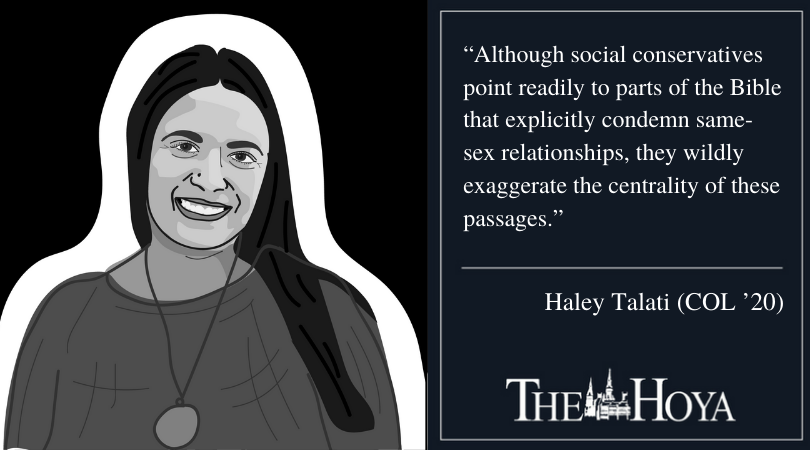Last Tuesday, Oct. 8, the U. S. Supreme Court heard arguments in two cases that will determine the legality of employment discrimination against members of the LGBTQ community. During the arguments, Chief Justice John Roberts voiced his concerns about preserving the rights of employers with religious objections to LGBTQ legal protections.
Although public opinion on employment discrimination, same-sex marriage and other LGBTQ rights issues has shifted rapidly to the left throughout even the last decade, many socially conservative Christians still cite their religious beliefs in defense of their opposition to homosexuality. But their arguments are largely based on disingenuous biblical readings.
Although these social conservatives point readily to parts of the text that explicitly condemn same-sex relationships, they wildly exaggerate the centrality of these passages. Specifically, they have singled out this issue as the one they want legally enforced when nothing in the text gives it a place of greater importance than the other prohibitions given along with it, many of which conservative Christians happily ignore.
I want to be very clear here: I strongly disagree with the biblical judgments on homosexuality, which are contrary to our modern ideals of equality and justice. However, it’s possible to recognize that conservative readings of these passages are profoundly disingenuous and elevate their condemnations of same-sex relationships far beyond what the texts themselves aim to justify.
The primary source in which anti-LGBTQ Christians find their biblical arguments is the writings of Paul the Apostle — a regularly cited example takes place in one of his letters to the Corinthians. Paul includes “sodomites” in his list of wrongdoers who “will not inherit the kingdom of God” (1 Corinthians 6:9). While there is some disagreement about the exact meaning of this verse, and although ancient ideas of homosexuality were very different from modern ones, there is no denying that social conservatives rely on this text and others like it to defend homophobia.
While Paul’s indictment may seem straightforward at first glance, his words must be read within the context of the rest of the passage. Paul also names “fornicators,” “adulterers,” “drunkards” and many others in his list of wrongdoers. Yes, we should recognize that the inclusion of homosexuality in a list of other categories that are presented as unequivocally bad is reprehensible, but it’s important to note that none of these classifications is awarded any special status among the rest. None is singled out as more blameworthy than any other.
This observation prompts an unavoidable conclusion: The use of the Bible to defend homophobia is an egregious example of religious cherry-picking in modern American politics. Social conservatives do not put nearly the same effort into codifying legal restrictions against actions like excessive drinking or cheating on one’s spouse. Paul puts all of these behaviors on equal footing — conservatives misrepresent his words when they single out homosexuality.
These same problems of interpretation apply to similar readings of other New Testament texts that condemn homosexuality. The judgments typically appear as just one part of extensive lists of human vices, and, while we should certainly denounce Paul’s words here, there is simply no legitimate rationale for choosing this particular item from the lists to elevate to the status that conservatives have given it in national politics.
I am not arguing for a rehabilitation of what the Bible has to say on this subject, and I do not believe we should give notions of religious liberty any power to restrict the dignity of the LGBTQ community. Unfortunately, however, this issue is one in which social conservatives lean heavily on biblical texts to justify intolerance. This political reality means progressives should familiarize themselves with the interpretive flaws inherent in this argument in order to thoroughly call out its illegitimacy.
Haley Talati is a senior in the College. Between the Lines appears online every other Wednesday.















Melanchthon • Oct 19, 2019 at 8:28 pm
The author is quite right that Christians do not spend nearly enough time preaching against drunkenness, adultery, and other sins, at least not on the national political stage in the United States. Her conclusion, however, gets the solution backwards: instead of abandoning all our convictions, we need to redouble our efforts against all these forms of evil, beginning in our own lives and then radiating outward through preaching, teaching, and setting an example of God’s love in the world. We will never be able to obey God’s commandments perfectly, but that’s no excuse for letting go of them. There also isn’t much ‘serious disagreement’ about the meaning of Paul’s condemnations of homosexuality; see N.T. Wright (hardly a social conservative) on the texts in question.